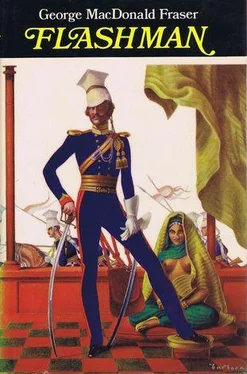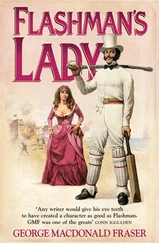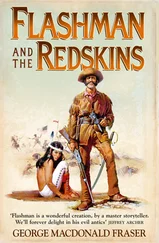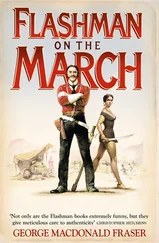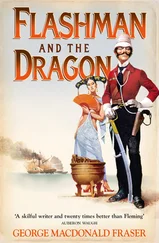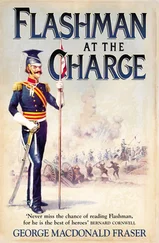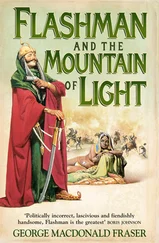From The Flashman Papers, 1839-1842
Edited and Arranged by GEORGE MACDONALD FRASER
Explanatory Note
The great mass of manuscript known as the Flashman Papers was discovered during a sale of household furniture at Ashby, Leicestershire, in 1965. The papers were subsequently claimed by Mr Paget Morrison, of Durban, South Africa, the nearest known living relative of their author.
A point of major literary interest about the papers is that they clearly identify Flashman, the school bully of Thomas Hughes' Tom Brown’s Schooldays, with the celebrated Victorian soldier of the same name. The papers are, in fact, Harry Flashman’s personal memoirs from the day of his expulsion from Rugby School in the late 1830s to the early years of the present century. He appears to have written them some time between 1900 and 1905, when he must have been over eighty. It is possible that he dictated them. The papers, which had apparently lain untouched for fifty years, in a tea chest, until they were found in the Ashby saleroom, were carefully wrapped in oilskin covers. From correspondence found in the first packet, it is evident that their original discovery by his relatives in 1915 after the great soldier’s death caused considerable consternation; they seem to have been unanimously against publication of their kinsman’s autobiography - one can readily understand why - and the only wonder is that the manuscript was not destroyed.
Fortunately, it was preserved, and what follows is the content of the first packet, covering Flashman’s early adventures. I have no reason to doubt that it is a completely truthful account; where Flashman touches on historical fact he is almost invariably accurate, and readers can judge whether he is to be believed or not on more personal matters.
Mr Paget Morrison, knowing of my interest in this and related subjects, asked me to edit the papers. Beyond correcting some minor spelling errors, however, there has been no editing to do. Flashman had a better sense of narrative than I have, and I have confined myself to the addition of a few historical notes.
The quotation from Tom Brown’s Schooldays was pasted to the top page of the first packet; it had evidently been cut from the original edition of 1856.
G. M. F.
One fine summer evening Flashman had been regaling himself on gin-punch, at Brownsover; and, having exceeded his usual limits, started home uproarious. He fell in with a friend or two coming back from bathing, proposed a glass of beer, to which they assented, the weather being hot, and they thirsty souls, and unaware of the quantity of drink which Flashman had already on board. The short result was, that Flashy became beastly drunk. They tried to get him along, but couldn’t; so they chartered a hurdle and two men to carry him. One of the masters came upon them, and they naturally enough fled. The flight of the rest excited the master’s suspicions, and the good angel of the fags in-cited him to examine the freight, and, after examination, to convoy the hurdle himself up to - the School-house; and the Doctor, who had long had his eye on Flashman, arranged for his withdrawal next morning.
Tom Brown's Schooldays THOMAS HUGHES
Hughes got it wrong, in one important detail. You will have read, in Tom Brown, how I was expelled from Rugby School for drunkenness, which is true enough, but when Hughes alleges that this was the result of my deliberately pouring beer on top of gin-punch, he is in error. I knew better than to mix my drinks, even at seventeen.
I mention this, not in self-defence, but in the interests of strict truth. This story will be completely truthful; I am breaking the habit of eighty years. Why shouldn’t I? When a man is as old as I am, and knows himself thoroughly for what he was and is, he doesn’t care much. I’m not ashamed, you see; never was - and I have enough on what Society would consider the credit side of the ledger -a knighthood, a Victoria Cross, high rank, and some popular fame. So I can look at the picture above my desk, of the young officer in Cardigan’s Hussars; tall, masterful, and roughly handsome I was in those days (even Hughes allowed that I was big and strong, and had considerable powers of being pleasant), and say that it is the portrait of a scoundrel, a liar, a cheat, a thief, a coward - and, oh yes, a toady. Hughes said more or less all these things, and his description was pretty fair, except in matters of detail such as the one I’ve mentioned. But he was more concerned to preach a sermon than to give facts.
But I am concerned with facts, and since many of them are discreditable to me, you can rest assured they are true. At all events, Hughes was wrong in saying I suggested beer. It was Speedicut who ordered it up, and I had drunk it (on top of all those gin-punches) before I knew what I was properly doing. That finished me; I was really drunk then - "beastly drunk", says Hughes, and he’s right - and when they got me out of the "Grapes" I could hardly see, let alone walk. They bundled me into a sedan, and then a beak hove in sight and Speedicut lived up to his name and bolted. I was left sprawling in the chair, and up came the master and saw me. It was old Rufton, one of Arnold’s housemasters.
"Good God!" he said. "It’s one of our boys - drunk!" I can still see him goggling at me, with his great pale gooseberry eyes and white whiskers. He tried to rouse me, but he might as well have tried to wake a corpse. I just lay and giggled at him. Finally he lost his temper, and banged the top of the chair with his cane and shouted:
"Take him up, chairmen! Take him to the School! He shall go before the Doctor for this!"
So they bore me off in procession, with old Rufton raging behind about disgusting excesses and the wages of sin, and old Thomas and the chairmen took me to the hospital, which was appropriate, and left me on a bed to sober up. It didn’t take me long, I can tell you, as soon as my mind was clear enough to think what would come of it. You know what Arnold was like, if you have read Hughes, and he had no use for me at the best of times. The least I could expect was a flogging before the school.
That was enough to set me in a blue funk, at the very thought, but what I was really afraid of was Arnold himself.
They left me in the hospital perhaps two hours, and then old Thomas came to say the Doctor wanted to see me. I followed him downstairs and across to the School-house, with the fags peeping round corners and telling each other that the brute Flashy had fallen at last, and old Thomas knocked at the Doctor’s door, and the voice crying "Come in!" sounded like the crack of doom to me.
He was standing before the fireplace, with his hands behind looping up his coat-tails, and a face like a Turk at a christening. He had eyes like sabre-points, and his face was pale and carried that disgusted look that he kept for these occasions. Even with the liquor still working on me a little I was as scared in that minute as I’ve ever been in my life - and when you have ridden into a Russian battery at Balaclava and been chained in an Afghan dungeon waiting for the torturers, as I have, you know what fear means. I still feel uneasy when I think of him, and he’s been dead sixty years.
He was live enough then. He stood silent a moment, to let me stew a little. Then:
"Flashman," says he, "there are many moments in a schoolmaster’s life when he must make a decision, and afterwards wonder whether he was right or not. I have made a decision, and for once I am in no doubt that I am right. I have observed you for several years now, with increasing concern. You have been an evil influence in the school. That you are a bully, I know; that you are untruthful, I have long suspected; that you are deceitful and mean, I have feared; but that you had fallen so low as to be a drunkard - that, at least, I never imagined. I have looked in the past for some signs of improvement in you, some spark of grace, some ray of hope that my work here had not, in your case, been unsuccessful. It has not come, and this is the final infamy. Have you anything to say?"
Читать дальше
Конец ознакомительного отрывка
Купить книгу
